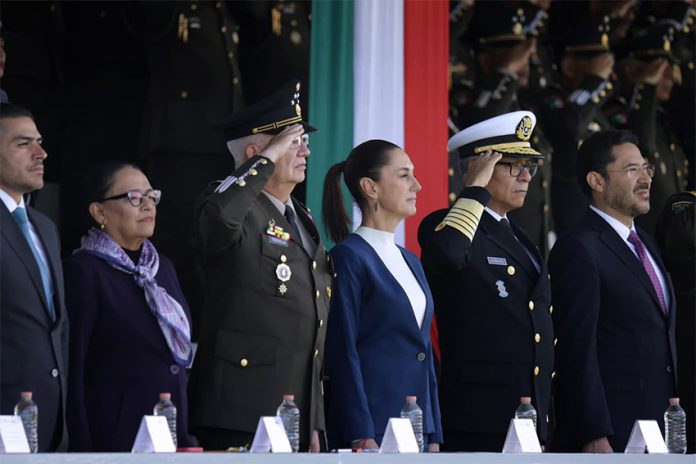In the first 100 days of the new federal government, President Claudia Sheinbaum’s security strategy will focus on combating violence in Mexico’s 10 deadliest cities, according to a plan seen by media outlets.
Sheinbaum, who was sworn in as Mexico’s first female president last Tuesday, said last week that she would present the government’s National Security Plan this Tuesday.
Ahead of that presentation, The Wall Street Journal (WSJ) and Mexican news website Animal Político reported separately on the government’s security plan for its first 100 days in office, a period that extends until Jan. 8, 2025.
Animal Político reported that the main “emerging strategy” to be implemented by the federal government will focus on reducing crime and violence in the 10 municipalities with the highest homicide rates in the country.
According to official data, those municipalities are Colima city, Tijuana, Acapulco, Celaya, Cajeme, Ciudad Juárez, Tlajomulco de Zúñiga, León and Benito Juárez (Cancún). One-quarter of all murders in Mexico linked to organized crime occur in those cities, where the government will “push to slash killings,” according to the WSJ.
The new security strategy will first be rolled out in six cities in five states: Tijuana (Baja California); León and Celaya (Guanajuato); Acapulco (Guerrero); Benito Juárez (Quintana Roo); and Colima city (Colima).
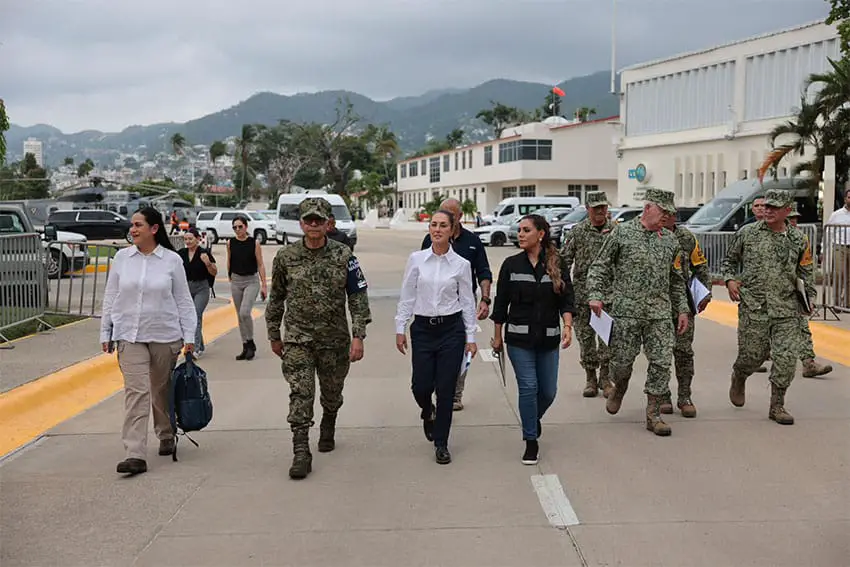
The Wall Street Journal, which saw a “presentation” outlining the federal government’s security strategy, said that Sheinbaum “is using her first 100 days in office to try to lower homicides and loosen the grip of organized crime groups that control swaths of the country, extort businesses, smuggle drugs and kill with impunity.”
The Journal also reported that the new president is “planning new efforts to combat the smuggling of the deadly drug fentanyl.”
Drug cartels in Mexico manufacture fentanyl with precursor chemicals sourced from China before shipping large quantities of the powerful synthetic opioid to the United States, where tens of thousands of people die from drug overdoses every year.
Sheinbaum revealed last week that combating crime in Mexico’s most violent cities would be a priority, saying that her government was “developing a program for the municipalities that at this moment have the largest number of homicides.”
She has also said that federal and state prosecutors and security forces will increase their coordination in Mexico’s most violent areas.
John Creamer, a former senior U.S. diplomat in Mexico, told the WSJ that “the identification of 10 priority municipalities is very good.”
However, it remains to be seen whether the government will provide adequate funding and security personnel to the task of reducing violence in those municipalities, he said.
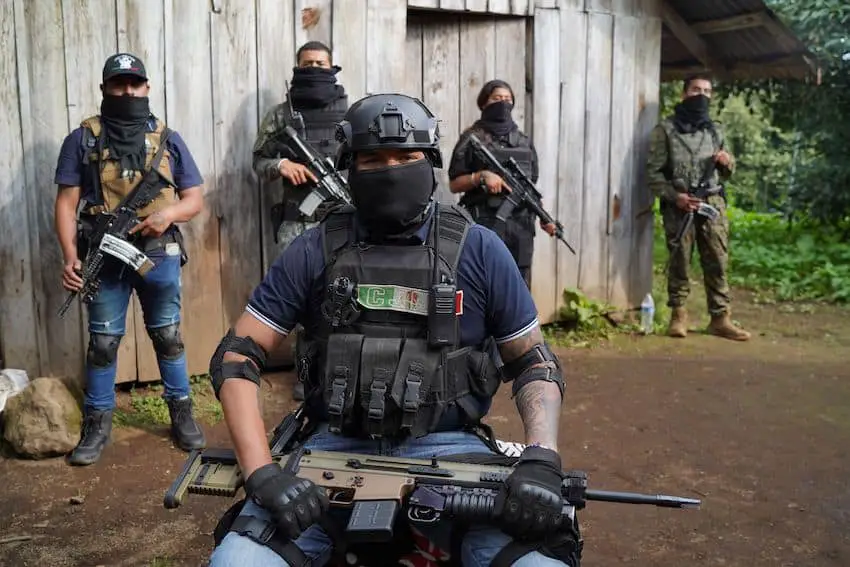
The government’s security strategy will be led by Security Minister Omar García Harfuch, who served as Mexico City security minister while Sheinbaum was mayor of the capital.
Homicide numbers almost halved during Sheinbaum’s mayorship, according to official data.
President inherits a complicated security situation
Homicide numbers declined in the latter half of Andrés Manuel López Obrador’s six-year term as president, but remain very high. According to data published by the national statistics agency INEGI in August, there were 31,062 homicides in 2023, a 6.7% decline compared to the previous year.
Mexico’s five most violent states in 2023 in terms of total homicides were Guanajuato, México state, Baja California, Chihuahua and Michoacán. The sixth most violent state last year was Guerrero, where the mayor of Chilpancingo, the capital, was murdered on Sunday just six days after he was sworn in.
The WSJ said that Sheinbaum’s security plan includes a focus on Guanajuato, “which has the highest rate of organized-crime killings of any Mexican state.”
“Located in central Mexico, the state is a battleground for the lucrative black-market fuel controlled by the Jalisco cartel, one of Mexico’s most powerful organized crime groups, and the local Santa Rosa de Lima gang,” the Journal said.
Sheinbaum also faces precarious security situations in other states, including Sinaloa, where a war between the “Los Chapitos” and “Los Mayos” factions of the Sinaloa Cartel has intensified in recent weeks, and Chiapas, where the Sinaloa Cartel is fighting the Jalisco New Generation Cartel in the border region of the southern state.
Animal Político, which reported on a document entitled “Security Strategy for the First 100 Days,” and The WSJ said that Chiapas is also a focus of the government’s plan.
In the state, where six migrants were killed by the Mexican army on the day Sheinbaum was sworn in, the new government plans to “carry out operational tasks” and implement programs “focused on attention to the causes [of crime],” Animal Político said.
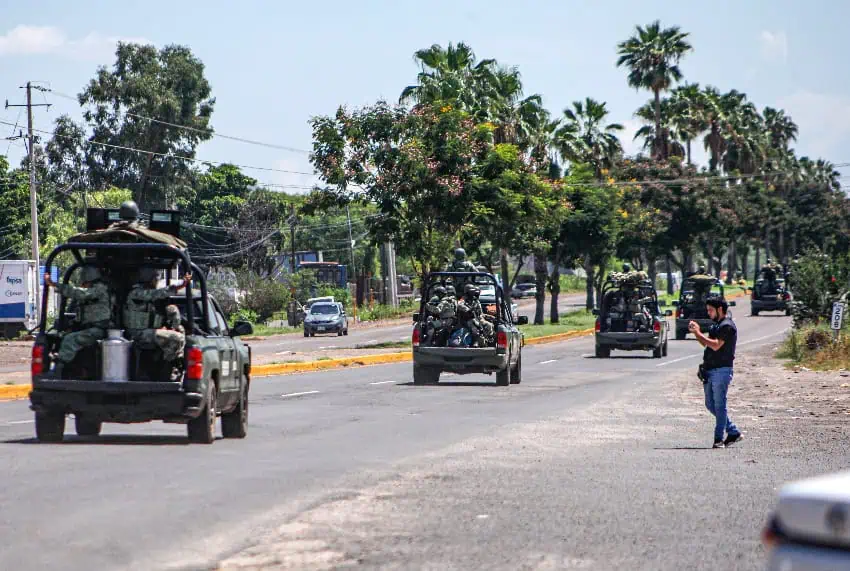
The WSJ said that “another city getting the new government’s attention is Culiacán,” the capital of Sinaloa.
However, the Journal didn’t detail any specific security plans for the city where the fighting between the rival Sinaloa Cartel factions has been centered.
In Michoacán, “Sheinbaum’s plan calls for the government to end the extortion in the lime industry,” the newspaper said, noting that “a dozen gangs prey on growers, packers and distributors.”
Animal Político said that the government’s efforts in the state will focus on the municipalities of Nueva Italia, Antúnez, Buenavista, Tepalcatepec, Aguililla and Apatzingán.
‘Intensive’ use of intelligence key to security plan
The WSJ reported that Sheinbaum’s security strategy “calls for the intensive use of intelligence to assess the structure of criminal groups, and finding ways to use police intelligence to make cases at trial.”
For its part, Animal Político said that the new government will aim to “strengthen the intelligence work of the country’s main intelligence institutions.”
An ‘alternative’ security cabinet to be created
Animal Político also reported that the federal government will create an “alternative” security cabinet made up of officials from the Finance Ministry’s Financial Intelligence Unit, the Federal Tax Prosecutor’s Office, the state oil company Pemex, the federal tax agency SAT, and other government entities focused on combating the illicit financing of crime and money laundering.
The government’s primary security cabinet is made up of the president, the security minister, the interior minister and other officials. It meets daily at 6 a.m. to assess the prevailing security situation across Mexico and determine what specific strategies and resources are required to remedy problems.
Animal Político said that the government will also have a specific security strategy for the nation’s highways, on which truck robberies and hijackings are a major problem.
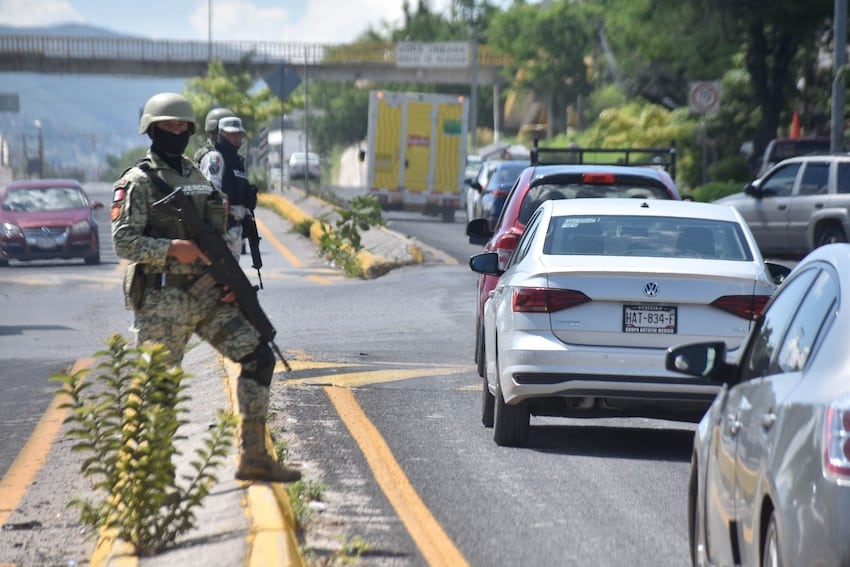
The WSJ said that Sheinbaum’s security plan “envisions a greater role for the federal government, with its national-security cabinet vetting state security chiefs appointed by governors.”
“The federal government would also establish nationwide standards for Mexico’s 32 state-police forces, state prosecutors and prison systems,” the Journal said.
Will Sheinbaum’s security strategy be a success?
While the answer to that question won’t come immediately, history suggests that curtailing violence in any significant way will be no easy feat.
López Obrador’s six-year term in office was the most violent on record in terms of homicides, with close to 200,000 murders.
Homicides increased sharply in Mexico after former president Felipe Calderón (2006-12) launched a militarized war on drug cartels. They continued to go up during the six-year term of Enrique Peña Nieto (2012-18).
The WSJ reported that “for decades, every Mexican president has made targeting the country’s transnational criminal organizations a priority, but these gangs have proved resilient to efforts to dislodge them from lucrative drug smuggling amid endemic corruption.”
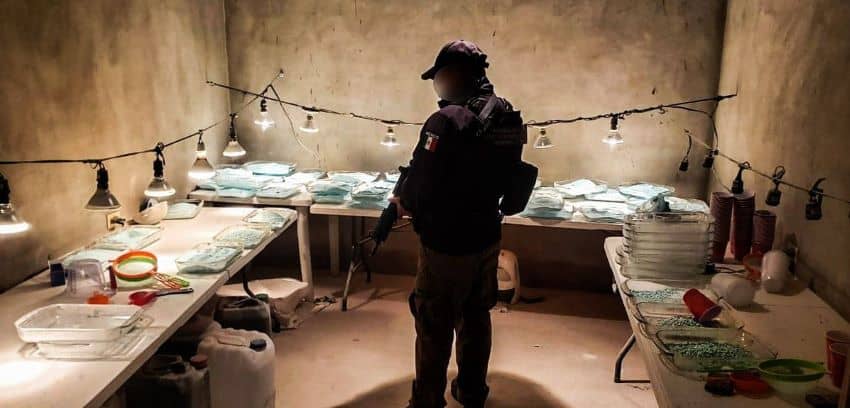
“… Conservative president Felipe Calderón declared war on the cartels, ushering in a period of violent conflict between gangs and government forces, while Sheinbaum’s mentor, former nationalist president Andrés Manuel López Obrador, tried a softer approach dubbed ‘hugs not bullets.’ Neither worked,” the newspaper said.
Sheinbaum, who was mayor of Mexico City between late 2018 and mid 2023, is committed to continuing López Obrador’s strategy, which favored addressing the root causes of crime through government welfare and social programs over combating criminals with force.
The new president and García Harfuch will be hoping they can replicate the success they had in the capital, where homicides declined to 747 in 2022 from 1469 in 2018, a 49% reduction.
García, the WSJ reported, “worked closely with U.S. law-enforcement agencies and boosted intelligence gathering, police training and salaries,” during his tenure as security minister in Mexico City.
“U.S. officials say they expect security cooperation to increase in a Sheinbaum presidency,” the newspaper added.
Although López Obrador made combating impunity a priority for his government, the vast majority of serious crimes committed in Mexico, including homicides, still go unpunished.
Reducing impunity rates will be another major challenge for Sheinbaum, who will serve a six-year term that concludes in 2030.
With reports from The Wall Street Journal and Animal Político
